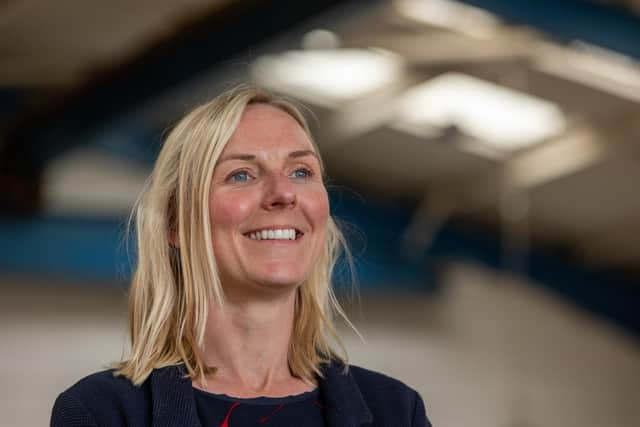Meet the Yorkshire timber director who swapped embalming for manufacturing
The operations director at manufacturing firm TimberTight says she has always had a morbid fascination with death and the afterlife.
"It all started at high school when I was very excited at the possibility of dissection during a science lesson. Unfortunately, we ended up dissecting a broad bean,” she says.
Advertisement
Hide AdAdvertisement
Hide Ad"I was always fascinated with the human body. I’d been lucky enough not to have anybody in the family pass away at that point and it all seemed very mysterious.”


Williamson enjoyed her school work experience at a funeral directors so much she embarked on a two-year, part-time British Institute Of Embalmers accredited course when she left. She carried out 50 embalmings and the course culminated in six written exams and a practical exam.
It was only because she had been promoted in her day job at a valve company by the time she finished the course, that she decided not to use the qualification in the end.
"By that point, I’d done enough embalming that it wasn’t a novelty any more,” she says. “I never did it again, although the qualification is still valid if I needed something to fall back on.”
Advertisement
Hide AdAdvertisement
Hide AdIt’s unlikely she’s going to need her back-up career any time soon, though. Williamson is currently operations director at TimberTight, a family-run business established in Cleckheaton, West Yorkshire, specialising in timber frame panels and forging ahead in a niche but expanding market.
The company designs, supplies and erects timber frame wall panels and floor cassettes for predominantly building houses.
The wooden structures replace breeze blocks, which are traditionally used in new-build housing, to speed up the building process.
The company was founded by Williamson and her husband, Paul, five years ago.
Now it’s a true family affair.
Advertisement
Hide AdAdvertisement
Hide AdAged 40, Williamson joined the company in 2019 after 13 years in the metal stockholding industry.
Her mum and stepdad also work in the business along with her husband’s parents.
She was working in a metal stockholding business at the time and helping Paul set up the business in her spare time. A few months into the project she became pregnant and ended up taking redundancy from her main job.
“By that point I’d already set up the structure of the business and it made sense to join the company,” she says.
Advertisement
Hide AdAdvertisement
Hide AdTimberTight already had a factory manager so Williamson began in a HR role. However, when the business began to grow, the factory manager left and Williamson took over the operations side of the business.
"The way we tend to describe it is that Paul gets the work in and I do everything else,” she says, half tongue-in-cheek before adding: “We have a design team who we wouldn’t be able to operate without.”
The turnover of the business was £3.75m last year and Williamson expects to top £5m this year. The company employs 30 staff.
The timber frame industry is very new compared to the mature non-ferrous metal market she worked in for so long.
Advertisement
Hide AdAdvertisement
Hide Ad"The timber frame market is very niche because it’s a small part of the industry,” she says. “There’s less competition and the margins are better.”
The Future Homes Standard - a set of rules that will come into effect from 2025 to ensure new homes produce less carbon emissions and are energy efficient – are set to be a gamechanger for the industry.
"The standard lends itself much better to building in timber frame rather than traditional brick and blocks,” she says. “Customers who have said in the past they want to stick with the traditional methods are going to have to think about it now because they’re going to struggle to achieve the standard if they don’t.”
She adds: “It’s going to go bananas. I feel like we’re in exactly the right place at the right time.”
Advertisement
Hide AdAdvertisement
Hide AdTimber prices have now settled after a huge spike in 2021 and 2022. “Timber prices nearly tripled,” says Williamson. “We went from paying £17,000 for a load to nearly £50,000. We were paying £100,000 a month for our biggest raw material.”
The business is currently focusing on expansion. It is increasing its capacity by taking on another unit at its production site on Brick Street in Cleckheaton.
It has also patented a Passivhaus-standard wall panel design.
Passivhaus refers to buildings created to rigorous energy efficient design standards so that they maintain an almost constant temperature.
Advertisement
Hide AdAdvertisement
Hide Ad"We successfully completed a 17-house project in Manchester which passed the Passivhaus standard with those panels so we’re really pleased about that,” Williamson says.
Currently in the UK, women make up 29 per cent of the manufacturing workforce, something Brighouse-born Williamson is keen to change.
"I’m trying to change that as best I can,” she says. “I’ve noticed a difference over the years. There were always ladies on the sales side of the non-ferrous metals industry but when you worked in external sales, you’d have to walk through the factories with all the lads looking at you, wondering what you were doing there.”
She adds: “There are more women in the construction industry, especially in marketing, but I was the only woman when I started working at TimberTight. I’ve since employed more and we’re slowly taking over.”
Advertisement
Hide AdAdvertisement
Hide AdWilliamson, who has a four-year-old son, describes herself as resilient, determined and committed. “Most of us leave school not knowing exactly what we want to do and that’s ok,” she says.
"You don’t need to know what you want to do, you just need to know that whatever you do do, you maximise that opportunity.”